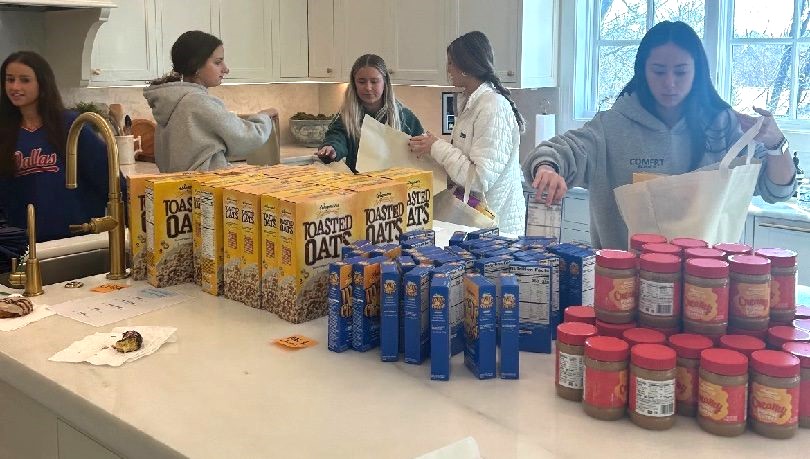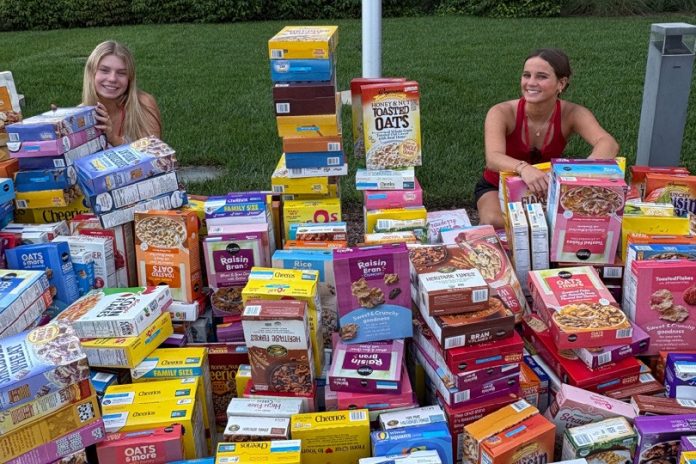Two Yorktown High School juniors are passionate about making sure people have enough to eat, and they’re proving teens have the creativity and the drive to make a difference in the community.
Best friends Arden Peale and Fiona Bensten, both 16, teamed up as freshmen to start the Feeding Hope Project, a nonprofit that hosts food drives and donates collected items to the Arlington Food Assistance Center and Loudoun Hunger Relief.
“We know [food insecurity] is a huge problem. We saw it affecting so many families,” says Peale. “We just wanted to give back, especially to kids and families.”
“We decided to take [that problem] into our own hands and see what we can do,” Bensten adds.
Real Results
As it turns out, they’ve done a lot. Last year, the Feeding Hope Project packed 1,000 Thanksgiving meals for Loudoun Hunger. Over the summer, they collected about 2,000 boxes of cereal through a “Box Up the Sunshine” cereal drive in partnership with QTS Data Centers, a Sterling-based tech company. That effort amassed enough cereal donations to provide breakfast for the several hundred families Loudoun Hunger supports for three months.
Roughly one in five Arlington County residents (about 22%) experienced food insecurity this year, according to the Capital Area Food Bank’s Hunger Report 2025, up from 16% in 2022. Food insecure households are more likely to have children, according to the report, and the majority of food insecure adults are employed.
A look at the broader DMV reveals even more troubling numbers, with 36% of residents across the region having experienced food insecurity this year.

Last winter, an online fundraiser organized by the Feeding Hope Project netted more than $1,000 in donations, which organizers then invested in 603 pounds of kid-friendly foods such as mac and cheese, peanut butter and pasta. “Once we had all these supplies—we had 100 of everything—we had a bunch of other kids from our area and our high school come and help pack it,” Peale says.
How It Works
The Feeding Hope Project carries out its mission in two ways. For some food drives, the teen-led organization raises money, sometimes by partnering with local restaurants that donate a portion of their sales to the effort. Peale and Bensten then use the cash donations buy grocery items and recruit helpers to pack them up.
Other efforts, like the cereal drive, round up in-kind donations of shelf-stable packaged foods.
View this post on Instagram
Charitable drives often center on a theme, Bensten says, especially around holidays. “We try and add little details that make it more attractive to people, make people want to make a difference,” she says.
Sometimes they offer incentives to drum up participation. “We try to make it more fun for kids, saying, ‘Whoever brings the most gets a gift card,’ ” says Peale, a strong advocate for teen engagement in service projects. “Teens have energy, creativity and social networks that enable them to make things happen. When other young people see teens making a difference, it inspires them to realize they can too.”
She and Bensten are currently working on plans for Thanksgiving, Christmas and Valentine’s Day drives.
A Growth Mindset
They’re also aiming to expand the organization’s size and reach. Right now, its core leadership is made up of the two founders, plus a financial coordinator and a secretary, both of whom are also teens.
“We’re trying to grow and continue to put our name out there every single day,” Bensten says. “We work with…the Teen Network Board. We’re hoping to partner with them to put our name out there and hopefully expand the amount of people [involved in the Feeding Hope Project].”
Going forward, they’re hoping to partner with local restaurants and grocery stores to collect and distribute unused food before it goes to waste.
They’re also looking to create an ambassador program to guide and support teens at other schools who want to start Feeding Hope chapters.
“Teens from other high schools can start a smaller version of Feeding Hope at their own school and in that, host drives, maybe just in their schools, but also get more people to come to our bigger-scale drives,” Peale says.
In the beginning, she and Bensten envisioned the Feeding Hope Project as an after-school club at Yorktown. When the school’s activities director denied their application (on grounds that Yorktown already had too many similar clubs, Bensten says) they decided to form a nonprofit. Through “a lot of trial and error” and with help from their parents, they filed with the Virginia State Corporation Commission. The decision paid off.
“We’ve [had] opportunities…that we wouldn’t have gotten if we were just a school club,” says Peale. “As a school club, we would be limited to just students and school events, whereas as a nonprofit, we can involve families, local companies and people all over the area.”
The work is time-consuming but a labor of love. “We both care for our community a lot,” Bensten says.
